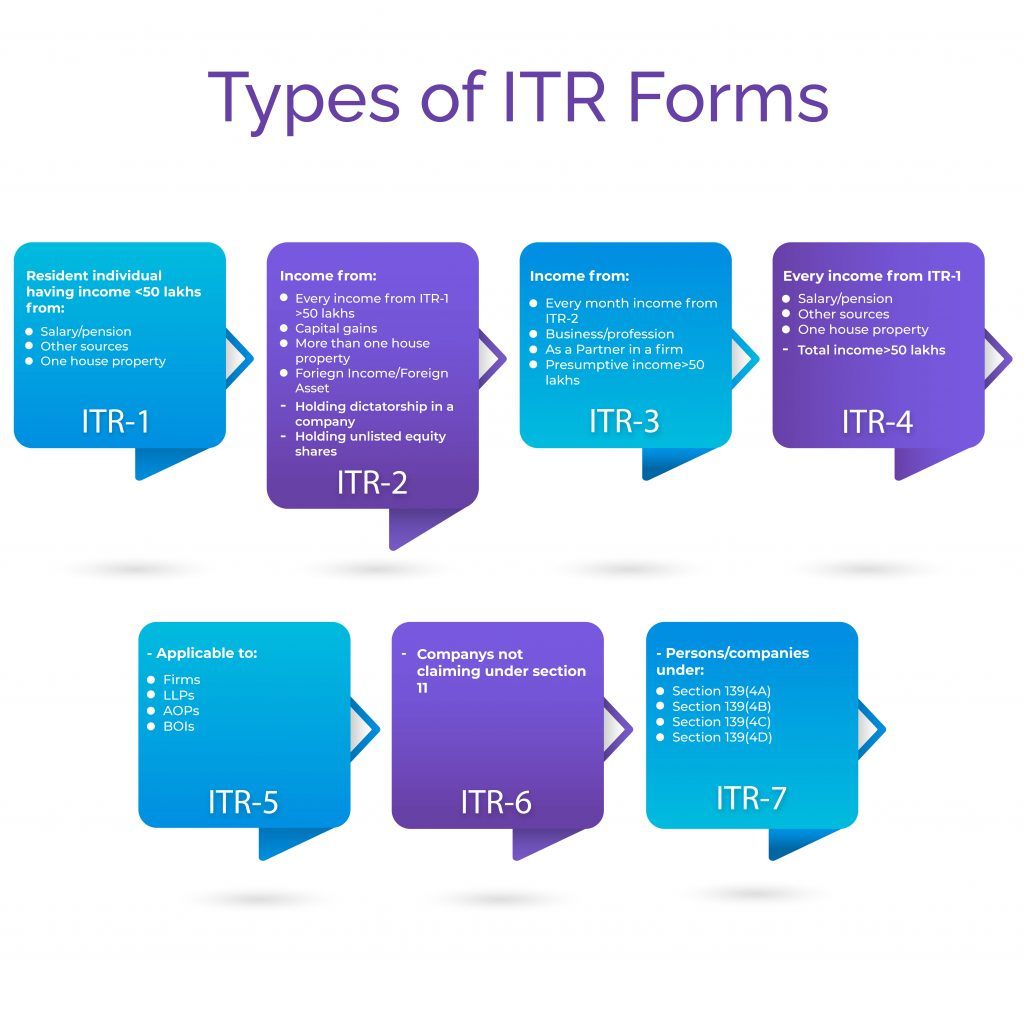The Income Tax Return (ITR) is an essential document taxpayers use to report their income, tax liabilities, exemptions, and deductions for a particular fiscal year. While there are several reasons why taxpayers are required to file ITRs, the primary objective is to claim tax deductions. By submitting an accurate and timely ITR, taxpayers can claim deductions on various expenses such as investments, health insurance, education, and more. It’s important to note that filing an ITR is mandatory for individuals whose income exceeds the specified limit set by the government. By fulfilling this obligation, taxpayers can claim deductions and avoid penalties for non-compliance with tax laws.
Income Tax Return
An Income Tax Return (ITR) is a required form that individuals and businesses use to submit information about their earnings and taxes to the income tax department. Per the law, individuals earning income during a financial year must file a tax return annually. The due amount is calculated based on the taxpayer’s income, and if too much tax were paid during the year, the individual would be eligible for an income tax refund from the Income Tax Department.
There are many ways to earn income, including earnings, Maximizing Business Profits, rental revenue from real estate, bonuses, capital gains, interest payments, etc. It’s important to note that individuals and businesses must file their tax returns by a specific deadline, failing which they will have to pay penalties.
Filing an accurate and timely ITR is crucial. As a taxpayer, you can use it to comply with tax laws and claim deductions for expenses like investments, health insurance, education, and more. For accurate and timely filing of your ITR, seeking professional assistance is crucial.
Eligibility to file Income Tax Return
According to the Income Tax Act, only individuals or businesses earning income above a certain amount must pay income tax. Those within this income bracket must follow the law and file their Income Tax Returns (ITRs) in India. Here is a list of those who fall into this category.
As per the Income Tax Act, individuals who are below 59 years old and have an annual income of more than ₹2.5 lakhs, senior citizens (aged 60 to 79) who earn more than ₹3 lakhs, and super senior citizens (aged 80 and above) who make over ₹5 lakhs are required to pay income tax. It’s important to note that the income limit is calculated before considering deductions under Sections 80C through 80U and other Section 10 exemptions.
Non-resident Indians (NRIs), who have assets or financial interests in organizations outside India and earn more than ₹2.5 lacks during a fiscal year, must file their Income Tax Returns (ITRs). Regardless of profitability, registered businesses that generate revenue must file ITRs, as are those seeking refunds for overpaid taxes. Additionally, foreign companies that benefit from agreement advantages on transactions conducted in India are also eligible to file ITRs.
In India, if your income for a fiscal year exceeds ₹2.5 lakhs, you must file an Income Tax Return (ITR). You only need to file a tax return if your gross income exceeds this limit. Nevertheless, it is advisable to file a tax return even if it isn’t mandatory. This is because if you earned any income from any source during the fiscal year, you should file a tax return.
Benefits of filing Income Tax Return in India
Claim for Excess TDS
Even if your income is not taxable, tax can still be deducted from your salary, Fixed Deposit, or any other source of income. For example, if your total income is below ₹2.5 Lakhs but you received ₹1 Lakh from an FD in the bank, the bank must deduct 10% tax from this amount. However, the deducted tax can be repaid by filing an ITR. One must submit a tax return to claim any TDS taken at the source.
VISA Application
Submitting ITR documentation with a visa application can reduce the likelihood of rejection or flagging the application as problematic. The tax return shows the person’s civic responsibility, and several countries now require ITR for visas due to rising security concerns. For instance, when applying for a Schengen Visa, you must submit the returns from the previous three years, even if you had no income.
Establishing Losses
If you have incurred losses in the stock market in the previous financial year, you must file a return, even if your income is zero. By doing so, you can carry the losses to subsequent years and offset them against future profits. If you own foreign stocks, it’s essential to know that you need to file an Income Tax Return (ITR) according to the income tax laws.
Reliable Proof of Address
When addressing verification, the Income Tax Return can serve as valid proof. It can even obtain an Aadhaar Card, a widely accepted identification document in India. In many cases, definitive proof of address documents like ID cards may not be accepted, but the ITR can be utilized as an alternative.
Authentic Evidence of Your Earnings
The ITR filing form provides a detailed breakdown of a person’s income and expenses for the entire financial year, thus establishing a more accurate picture of their financial situation. For self-employed individuals or independent contractors, the ITR filing form serves as reliable proof of their income. In contrast, Form 16 is typically issued by employers to employees as proof of their earnings.
For Purchasing High Coverage Insurance
Suppose you want to purchase a life insurance policy with a coverage amount exceeding ₹50 Lakhs. Insurance companies may require you to show them your ITR records to verify your annual income. This is because your income level is a crucial determinant of the coverage amount you are eligible for. Demonstrating a high-income level through your ITR records can increase your chances of getting approved for a high-coverage insurance policy.
A Crucial Document for Loan Application
When you apply for a loan from a bank to purchase a car, a new home for your family, or your business, the bank will request specific documents from you. These may include identification documents such as Aadhaar cards, PAN cards, licenses, and photo identification. Additionally, your income proof is a crucial document that is required. Banks often request ITR for the previous three years to determine your financial stability and ability to repay the loan. ITR is necessary for bank loans and when applying for a credit card. Credit card companies also require prior earnings and tax returns before issuing a credit card.
Scholarship Advantages
Institutions and universities offer various scholarships, and an ITR is considered a source of income documentation by both government and private authorities. By submitting an ITR, prospective students can establish their ability to prove their income, which may increase their chances of being awarded the scholarship. Furthermore, insurance companies also accept ITR as valid documentation.
Funding for Startup Ventures
Funding from external sources like venture capitalists or seed investors may be required when launching a new company or expanding an existing one. These investors may examine the details of your ITR to evaluate your business’s financial stability and profitability. They may also cross-check the data in the audited report using your ITR forms.
Benefits for Independent Contractors and Professionals
Self-employed or independent contractors still need to receive Form 16, and their ITR is the only record demonstrating they have filed income taxes. This evidence is necessary for them to avoid difficulties with funding and transactional issues. Thus, having a well-documented ITR can benefit independent contractors and professionals.

Importance of Filing Income Tax Returns
Some people believe that filing tax returns is optional, leading them to view it as burdensome and unnecessary. However, this perspective is only partially accurate. Filing tax returns is considered a moral and social obligation of every responsible citizen of the nation. It serves as the foundation upon which the government calculates the amount and means of citizen expenditures. Moreover, it provides the assessee with a platform to request refunds and other forms of relief occasionally.
Filing income tax returns also contributes to nation-building by ensuring citizens contribute their fair share of taxes to support the government’s development initiatives. It strengthens the government’s efforts to create an equitable and just society by redistributing wealth and resources.
Apart from fulfilling social responsibilities, filing tax returns benefits the assessee in several ways. It serves as proof of income, which is required for various purposes such as obtaining loans, applying for visas, and buying insurance. It also helps create a financial history, which can improve the creditworthiness of the assessee.
What are the Eligibility Criteria for filing Income Tax?
According to the Income Tax Act, income tax is only required to be paid by individuals or corporations who fall into particular income bands. The entities or enterprises listed below are required to file ITRs in India regularly:
- Individuals under the age of 59 who earn more than Rs 2.5 lakh in a year. The maximum increases to Rs. 3 lakhs for senior persons (aged 60-79) and Rs. 5 lakhs for super-elderly people (aged 80 and above). It’s worth noting that the income amount should be determined before considering the deductions available under Sections 80C to 80U, as well as the additional exemptions available under Section 10.
- All businesses, whether or not they have generated a profit throughout the year.
- Those who want a refund for any extra taxes deducted or income taxes paid.
- A person’s withholdings or financial interests in companies based outside of India.
- Treaty-advantaged foreign businesses that conduct business in India.
- NRIs who earn or accrue more than Rs. 2.5 lakh in India in one financial year
In addition to the above-mentioned points, if a person dies in the middle of a fiscal year, an ITR should be filed for them as well. It is based on their earnings up until the time of their death. In this instance, the IT returns should be filed by their legal heir. This is significant because insurance companies want proof of income to sanction an amount for an accident in court. As a result, the claim amount can be simply obtained by producing the ITR receipts.
Effects of failing to file an ITR
Now that you know the benefits of filing an Income Tax Return, it is essential to consider the potential consequences of failing to do so. Here are some of the effects of not filing an ITR:
- If an individual is liable to pay income tax, the Income Tax Department may notify them.
- If someone cannot file their Income Tax Returns for a valid reason, they may write a detailed letter and provide any necessary supporting documents to request condonation relief.
- Late filing of ITRs can result in penalties imposed by the IT Department. If a person’s income exceeds ₹5 lakhs, they may be required to pay a penalty of ₹10,000. If their income exceeds this amount, the fine may be ₹1,000.
- In severe cases, such as tax evasion, the assesses may face harsh legal consequences, including detainment.
- As per the announcement by the Finance Minister in the Union Budget for 2021, seniors aged 75 years or above can receive a total exemption from filing ITRs. However, some people may be exempt from filing an income tax return. Understanding the consequences of failing to file an ITR and fulfilling one’s civic duty as a responsible citizen is essential.
There are numerous benefits to filing your Income Tax Returns every year, and no good reason to avoid this critical process. Filing your taxes on time and submitting your returns can help you establish proof of income, qualify for loans and scholarships, purchase insurance, and even attract funding for your business ventures. Please complete your ITR to avoid penalties, fines, and legal troubles. Therefore, it is essential to prioritize the ITR Filing process and stay on top of your taxes.
Joining an Income Tax course allows one to know more about filing Income Tax Returns. Finprov is an ed-tech institute offering graduates and professionals accounting courses, including Income Tax courses. Finprov’s comprehensive online income tax accounting course is designed to provide learners with a clear understanding of income tax. This course covers the fundamental concepts of income tax, significant heads of income, tax frameworks, old and new tax schemes, and TDS and TCS basics.
With Finprov’s income tax online accounting course, learners can acquire explicit knowledge of income tax and become proficient in applying the concepts to real-world scenarios. In addition, learners will learn about due dates, penalties, accounting books, and accounting maintenance. To facilitate practical learning, each topic is followed by hands-on training that helps learners gain a deep understanding of the concepts.





